The voice was strong and passionate. The "fired up" catchphrase was familiar. The two-thousand strong Florida crowd of Democrats was adoring as they were urged to get to the polls.
But the Obama on the stage was not Barack. It was Michelle. In a fiery piece of oratory given in a sports hall at Broward College in Davie, Florida, the first lady was a natural campaigner getting the full rock star treatment every bit as much as her spouse does.
"Yeahhhh!" she said as she took to the podium. "This is what I call a rally!" She looked out at the roaring crowd. "I can tell you all seem pretty fired up and ready to go. And that's a good thing because I am really fired up and ready to go myself," she said.
But Michelle Obama does not have the field to herself when it comes to the fierce and increasingly tight election battle of 2012. Ann Romney, wife of Republican challenger Mitt, has also emerged as a powerful advocate for her husband. She, too, is criss-crossing the battleground states, enthusiastically rallying Republican foot soldiers for her spouse's cause.
Both candidates' wives have the same role: energise the base and humanise their husbands with warm tales of character and family life. But now, as the neck-and-neck election draws to a close, each is also seen as a vital advocate for what is emerging as the most important demographic in the contest: women voters.
A new poll, published on Thursday, showed that Obama's long-held lead among women voters had all but vanished as Romney's campaign has enjoyed a remarkable national surge and brought the overall race to a virtual dead heat. After months of leading by double digits among female voters, the AP-GfK survey showed the candidates now tied at 47% among women. Just a month ago Obama's lead had been a huge 16 points. "Often the Democrats have taken the female vote for granted. But this is four years into an economic crisis and the Republicans have hoped to siphon off some of that female support on economic issues," said Katherine Jellison, an expert on women's history at Ohio University.
Michelle Obama and Ann Romney are now a key part of each campaign's fight for women voters. But they are making their pitches to wildly different audiences and in significantly different ways. They are also very different people. One is a black ex-lawyer who once earned far more than her husband. The other is a blonde housewife, devout Mormon and mother of five boys. Mirroring their husbands' polarised campaigns, the efforts of Ann Romney and Michelle Obama are also studies of opposites even as they share the goal of winning the White House.
At Broward, Michelle Obama hammered away at a mixed-race crowd gathered at a community college in a lower-middle class neighbourhood of small homes and strip malls lined with fast food joints. She gave an impassioned speech for about 45 minutes, heavy on her husband's policy achievements from the past four years. She came across as a natural speaker, mixing in anecdotes of family life with a stern lecture on the importance of volunteering for the campaign. "I don't care what's going on, sign up to do something before election day," she insisted.
Meanwhile, near Orlando, Florida, Ann Romney made her own pitch this week. She spoke outdoors in a bucolic city park in Winter Park, one of the wealthiest communities in Florida. Just off a street lined with expensive restaurants and fashionable boutiques she spoke to an overwhelmingly white crowd of locals. She emerged on stage clutching the hands of two young boys. "I have brought some special friends with me," she gushed. "These are two of my 18 grandchildren." Her speech, with a heavy emphasis on Romney family stories, was largely policy free and lasted just 15 minutes. But her image was flawless: that of a proud churchgoing mother and wife concerned for the future of America. At one stage she talked in folksy tones of her spouse's decision to run for president. She said she had asked her husband if it was "too late" to save America. "Mitt said: "It's growing late. It's getting very late. But it's not too late yet." I said: "That's all I need to know. Go save America!"," she explained.
Despite – or in fact because of – their hugely different styles, both candidates' wives are popular with their party's grassroots. "I feel like I won a million dollars. She's very boisterous. She is active. When she speaks it's more heartfelt," said Shanovia Brown, 33, a corrections officer at Michelle Obama's Broward rally.
But in Winter Park, Ann Romney was hitting the spot, too. "She is very elegant, very classy. She will be a beautiful representative of America," said Beth Young, a 54-year-old flight attendant. Indeed, both Michelle Obama and Ann Romney are more popular than their husbands. In one recent poll, Michelle Obama's favourability rate was 69%, with Ann Romney at 52% - a jump of 12 points since April as her public profile has grown.
So far Michelle Obama has been the more active spouse. She has been a fundraising powerhouse, bringing in more than $17m since the start of the year. At one event having a photo taken with the first lady cost $5,000. Michelle Obama has also been on edgy late-night talk shows, like Jimmy Kimmel, and appeared at Hollywood fundraisers with stars like Will Smith. "With Michelle, Barack Obama can double the territory and double the number of donors reached," said Robert Watson, a professor of American studies at Lynn University.
Meanwhile, Ann Romney has been a little more reticent. She frequently appears alongside her husband on television, but less so by herself. Some experts believe that is a mistake. "She is not as naturally comfortable as Michelle. She has been under utilised," Watson said.
But being a first lady, or a would-be first lady, is an entry into a strange and tradition-bound corner of American politics. It is essentially a subordinate role whose main aim is to tell a husband's story. Michelle Obama, once a distinguished lawyer, calls herself a "mom-in-chief" and does not shy away from schmaltz. It is seen as "humanising" Obama, who is often viewed as aloof. "Although my husband is handsome and charming and incredibly smart – yes indeed – that is not why I married him. Listen closely. What truly made me fall in love with Barack Obama is something you all see every day – it's his character. It's his decency and his honesty," she said in Broward.
Ann Romney, too, lays it on thick. In Winter Park she spoke of how her husband tended to a dying boy in hospital, visiting him regularly, telling him about heaven and helping him with his final wishes. She spoke of pride of her husband's performance in the television debates. "To have Mitt Romney defining who he is and what kind of a person he is, I loved it," she said.
Telling these homely stories is seen as vital by campaign strategists, not for the spouse's own image, but for their husbands'. "We don't elect first ladies. Instead we think: this is the kind of spouse that he has chosen to marry and so her world view must line up with his," said Jellison. "Religious conservatives will hear Ann Romney's message and feel comfortable that she is a traditionally-minded woman and that her husband will champion that mindset."
Yet in the end their campaigning reduces both Michelle Obama and Ann Rommey to playing a subservient, traditionally "female" role in the election. Both tout their domestic credentials and experiences of motherhood. They talk about favoured recipes, their fashion choices are endlessly analysed and they do a whole parade of "softball" magazine and newspaper interviews. They chat to Elle, Home Journal, Parade and appear on Oprah Winfrey's show. "It is a guaranteed win-win. You get soft ball questions and they tend to be more popular than their husbands. You would be a fool not to send them out there," said Watson.
The crowds flocking to see them were not complaining. Mary Faro, a local academic, had waited for three hours to the see the First Lady come to Broward. "And I'd do it again. Happily," she explained. Supporters at the Ann Romney rally felt the same. "When she speaks, she speaks from the heart. You can sense a phoney, and Ann Romney is very genuine," said Hib Theriault, a retired army colonel.
All of which explains why the candidates' wives have been so active as the election enters it final and fiercest phase. They are both succeeding at the part of politics that is more a high school contest popularity contest than a policy debate. "Not all voters like policy. It's like the prom king and queen, and no one tells a person's story as well as their spouse," said Watson.
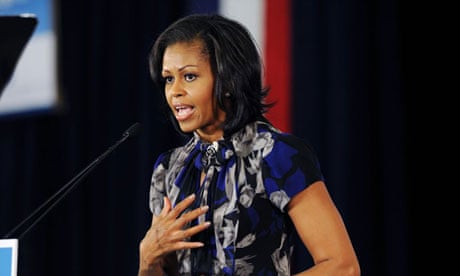

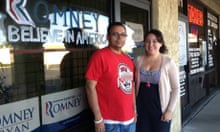
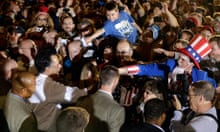
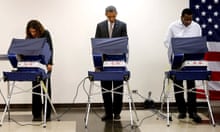

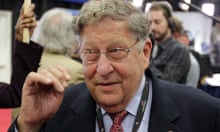
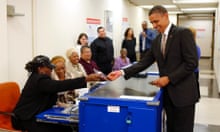
Comments (…)
Sign in or create your Guardian account to join the discussion